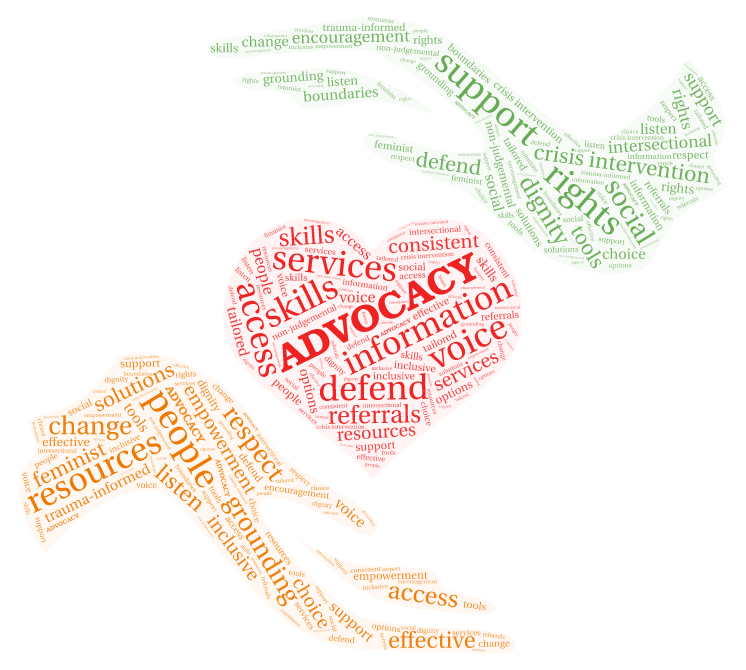
Partner Spotlight: Sexual Assault Response Team (SART)
Experience has shown that counties with SARTs meet the challenges of effectively responding to sexual assault better than counties that do not have SARTs. In a system where response is comprised of an increasingly complex array of responders and service providers, a coordinated, multidisciplinary approach is the best response.
SART is an acronym to describe the county-wide Sexual Assault Response Team. This team is made up of several disciplines like: Law Enforcement, medical professionals, prosecutors, community-based advocates like the Rape Recovery Center advocates, and Sexual Assault Nurse Examiners (SANE). We are lucky to work with amazing community members throughout the state and each month we are able to come together to support survivors of sexual assault through SART. This group is comprised of a multi-disciplinary team that comes together to talk about different issues in the community that relate to sexual assault survivors. Also, we are here to educate professionals on trauma-informed care and best practices.
SARTs began forming in the United States more than 30 years ago and continue to form across the country as needed ("SART toolkit section 1," NSVRC). In 2001, Salt Lake County formed a planning committee for SART's Best Practice Guidelines. The committee included members from the Rape Recovery Center, Salt Lake Sexual Assault Nurse Examiners, Salt Lake County Law Enforcement, the Salt Lake County District Attorney's Office, the Office of Crime Victim Reparations, and the Salt Lake Regional Medical Center. The guidelines were distributed during the Annual Crime Victims Conference in 2001.
Experience has shown that counties with SARTs meet the challenges of effectively responding to sexual assault better than counties that do not have SARTs. In a system where response is comprised of an increasingly complex array of responders and service providers, a coordinated, multidisciplinary approach is the best response.
-National Center on Domestic and Sexual Violence
According to the Utah Coalition Against Sexual Assault, the Sexual Assault Response Team (SART) Coordination Program has the following goals and objectives:
Goal: Strengthen formal and informal local and statewide multidisciplinary efforts to provide a victim-centered response for victims of rape and sexual assault through law enforcement, prosecutors, courts, victim service agencies, medical providers, corrections, crime lab, and other state agencies and departments.
Objective: To help sexual assault service providers build, expand, formalize, and maintain strong interagency responses to sexual violence in communities where there is currently no coordinated multi-disciplinary response to rape and sexual assault.
Objective: Promote the sustainability of existing SARTs by increasing team skills and capacity for a consistent victim-centered response that is culturally relevant and responsive to the unique needs of the communities they serve.
The Rape Recovery Center, in partnership with the multi-disciplines of SART, make the best changes, and advocate for sexual assault survivors in Salt Lake County.
Tools for Healing: What is advocacy?
We hold silence as survivors come forward for the first time and tell their stories. We are experts at celebrating healing milestones and holding silence and grief together. We do this work with great honor and respect as we understand that healing work hurts, but not healing hurts more.
“All advocacy is, at its core, an exercise in empathy.”
The Rape Recovery Center’s services are at no cost to survivors as we work with 14 and older primary and secondary survivors. We work hard to ensure we provide language access and currently have staff in every program who speak Spanish and have translation available. Our advocacy comes in the forms of direct services to survivors of sexual violence seeking a forensic exam or advocacy-only response in Salt Lake County, Tooele County, and the Family Justice Center, in-house services for crisis support, and follow-up. The in-house Advocates aim to provide crisis intervention, an immediate, supportive response, short-term case management, and referral services.
Our favorite tool to share with survivors, their family members, and friends is that all can advocate for survivors. Although hospital response team advocates and in-office advocates are trained professionals, they are also passionate about supporting survivors. The most critical thing we do is reinforce that we are merely partners in this healing process. We help survivors uncover their innate strengths and develop and practice new coping methods when viewing themselves and their experiences. We assist survivors as they implement coping strategies amidst a panic attack, flashback, anxiety, depression, etc. We hold silence as survivors come forward for the first time and tell their stories. We are experts at celebrating healing milestones and holding silence and grief together. We do this work with great honor and respect as we understand that healing work hurts, but not healing hurts more.
Our favorite truth to share with survivors is that they are the experts in their lives. Our advocates can share and teach practical, evidence-based ways to combat post-traumatic symptoms while honoring lived experiences. We emphasize choice and empower self-determination at every step of the healing journey. We teach our clients how to advocate for themselves beyond 4-6 hours as they undergo a sexual assault evidence collection exam, work with one of our Victim Advocates in-office for 4-6 weeks, or as needed to receive resource and referral advocacy. Our ultimate goal is to enable self-advocacy, which includes asking for help and balancing self-care and preservation.
Our advocates believe wholeheartedly that healing transcends. We believe that when one individual embarks on the healing journey, it makes room for others around them to heal, too. We provide services to family members and friends of survivors because we understand the impact of sexual violence often includes those closest to survivors.
Our highest intention in doing this work is to inspire hope. We aim to share the good news:
Healing includes us all
Everything that is needed to recover from trauma has existed within us long before the trauma.
We are partners in helping to uncover inner strength, and it is an honor and privilege to witness healing.
You can reach us at our front-line desk Monday - Friday, 9 a.m. to 5 p.m. at 801-467-7282. We have options for virtual or in-person appointments, so please call our front-line desk to schedule an appointment today. The Utah 24-Hour Sexual Assault Help-Line is available at (801) 736-4356 and Linea de Apoyo de Violencia Sexual las 24-Horas de Utah: (801) 924-0860


